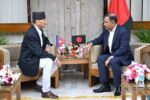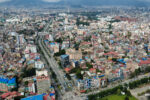With 42 cases detected since January, how seriously are Nepalis preparing for the pandemic?
Nepal’s long land border with India (1,800 kilometers) is usually open so that citizens of both countries can come and go easily without visas and usually with little notice from the police posted at entry points.
On March 24 India closed that border, along with all other access to the country of 1.4 billion people. The same day Nepal also declared a ‘lockdown’ and barred all entries.
But it’s been estimated that there are 500 official and unofficial entry points along the imaginary line between the two countries and in the days before and after the lockdowns as close to half a million Nepalis living in India crossed home, according to the Nepali Times newspaper.
Wait, worry and try to comply since Nepal’s first case of COVID-19 was detected in January the country has tested just over 6,000 people.
A couple of cars and motorcycles drive by, far fewer than usual at this time, and we pass a couple of dozen other pedestrians carrying grocery bags.
Yet only 42 cases have been detected, and no one has died of the coronavirus. How can that be is the question that everyone is asking, including officials in the Ministry of Health.
Nepal is sandwiched between China and India, and its first COVID-19 case was a student studying in the disease epicenter of Wuhan. Flights from China to Nepal continued after the government blocked other country’s carriers from landing in the capital Kathmandu, and with more than 10,000 cases the epidemic is growing ominously in India, all of which means that we wait, worry and try to comply.
On 11 April, a Qatar Airlines plane ‘evacuated’ 141 Canadians from Kathmandu to Montreal, most of the tourists who were stranded after the sudden lockdown announcement.
That morning my wife and I walked for five minutes to our local vegetable market as we’ve been doing most days during lockdown — stores are open from 5 to 8 a.m.
A couple of cars and motorcycles drive by, far fewer than usual at this time, and we pass a couple of dozen other pedestrians carrying grocery bags.
At the market, shopkeepers arrange their fresh fruit and vegetables in neat mounds in front of their tiny shops, while others sell from mobile wooden wagons heaped with produce.
White circles painted on the pavement to mark correct social distancing have all but faded away. People have been primed for the pandemic to hit, but without any evidence dramatic enough to match the warnings it’s difficult for them to maintain readiness.
As a result, we have a lip-service lockdown that does not pass close scrutiny. While almost everyone is wearing a face mask – usually a paper, surgical one or a re-useable cloth mask – disturbingly, a seller in one of the busier shops who is weighing and bagging items and making change is not.
Nepal has arrived at a kind of limbo: people have been primed for the pandemic to hit, but without any evidence dramatic enough to match the warnings it’s difficult for them to maintain readiness.
Other people I see have arranged too-small masks to cover only their mouths leaving their noses exposed. Friends have told me that they are impressed with the Government of Nepal’s response to the pandemic.
Before the lockdown, on 22 March, it banned all international flights. Even earlier it ensured a steady supply of essential food, fuel and medicines to counter rumors of shortages that led to some panic buying.
So far, we’ve been able to find almost every item on our usual shopping list. Failing the tests Testing and other parts of the official response, however, have been failures.
It took 55 days for the government to complete 500 tests after the Wuhan case was confirmed. (Last week did see a noticeable upturn after the arrival of rapid diagnostic tests, and now officials are reporting that 500 tests are done daily.)
Two weeks ago the government awarded a contract to import protective gear, reagents for virus tests and other medical equipment from China to a private firm, but when media reported that the deal’s prices were being artificially inflated, and linked the company to the prime minister’s office, the contract was put on hold.
On our way to shop on a recent morning a cruising police truck slowed next to us, its driver asking why we weren’t home.
He was satisfied when I showed him our shopping bags. But away from the main streets, people are less compliant.
Gazing from our first-floor balcony recently I spied a group of our neighbors sitting on the ground in close circle playing cards. Even officialdom is not always walking its talk.
A media report from western Nepal revealed that people in one quarantine site are sharing beds and even cigarettes.
Nepal has arrived at a kind of limbo: people have been primed for the pandemic to hit, but without any evidence dramatic enough to match the warnings it’s difficult for them to maintain readiness.
As a result, we have a lip-service lockdown that does not pass close scrutiny. Despite having just 16 confirmed cases, officials have already concluded there is community transmission of the virus and given the lack of medical resources and the lax lockdown the country is ripe for a devastating outbreak.
People have been primed for the pandemic to hit, but without any evidence dramatic enough to match the warnings it’s difficult for them to maintain readiness. As a result, we have a lip-service lockdown that does not pass close scrutiny.
(Marty Logan is a journalist and communicator living in Nepal)









Comment